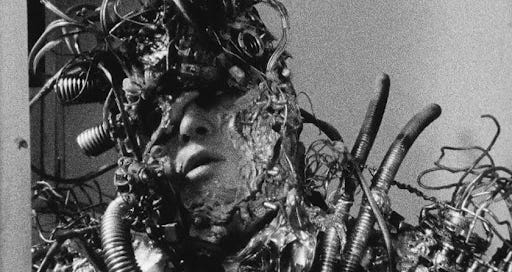To use a term like 'sadism' and to construct an elaborate psychological machinery to explain [human] behaviour, however, is to miss the point. The fact is, we are violent and dangerous creatures.
- J.G. Ballard, to Frieze
This week I was on the brilliant Anna Bogutskaya’s podcast The Final Girls, one of my favourite podcasts to guests on because of Anna’s incredible pairings; each season has a particular focus, and Anna curates discussions around two films per episode which she then shares with a variety of guests. This season’s focus is machines, and how horror movies explore technology. This, of course, is totally my jam.
The movies Anna and I discussed were 1987’s Robocop and 1989’s Tetsuo: the Iron Man, both startlingly violent explorations of where anatomy and metal collide, created from two completely different (but equally fascinating) angles. We discussed everything from metal fetishism to capitalist criticism, dipping into a lot of the things I explored in my book Electric Dreams, which is all about why we are so obsessed with the idea of sex robots. You can listen to the episode (and hear how much gleeful fun I had) here.
But there was another film that kept coming up in discussion, and that was David Cronenberg’s Crash, based on the infamous J.G. Ballard novel of the same name (which itself started life as a ‘condensed novel’ in Ballard’s even more infamous collection The Atrocity Exhibition, about which I could probably write a thesis by now). All three of these films are, I think inarguably, explorations of what happens to a person when the real stuff of technology interacts with their corporeal form; Crash and Tetsuo, however, look at this through the prism of sex. Or, more properly, through the prism of fucking (or being fucked by) metal.
For the uninitiated: Crash, the novel, follows a character named James Ballard who gets into a car accident near an airport in London and encounters Vaughan, a man sexually obsessed with celebrity car crashes, whose ultimate goal is to die in a pile-up with the movie star Elizabeth Taylor (who was still vitally alive at the time of the book’s publication). Surrounding Vaughn is a small but intense group of crash survivors who similarly fetishise vehicle collisions, seemingly unable to have normal sexual relations without in some way bringing them back to the explosive moment that fender meets flesh, each one striving towards some ultimate sensual experience that they cannot achieve without the singular crash. The expansiveness of their fetish throws into question their relations with others, with their desire and with themselves, especially the men. Cronenberg’s movie is a mostly (and amazingly, given the content) faithful adaptation of the novel, with a notable focus on rimming (an extended joke about wheel rims? I have never quite decided).
The characters of Crash are not without complication even prior to Vaughn’s entry into their lives. In the film, we meet James Ballard and his wife Catherine as they engage in trysts with other people, Catherine (played by Deborah Kara Unger) being fucked from behind by a man in a hangar as she presses her breast to a plane, and James (James Spader, a man who must appear in every good weird film about sex) holding up production on one of his own films by screwing a crew member (again, from behind) in a closet. Despite the proximity of the machinery, neither of them achieve satisfaction. Later, they share the details of these encounters in an attempt to layer them over their own sexual interactions. Responding to her husband’s disappointment at his attempts with the coworker, Catherine tells him: maybe the next one. You’re left with the immediate and enduring sense that these people are pathologically perverted, striving not in the direction of pleasure but towards some imagined climax as an escape from their comfortable and relatively privileged lives, which nonetheless they seem to find sterile and unfulfilling.
Keep reading with a 7-day free trial
Subscribe to general observations on eggs to keep reading this post and get 7 days of free access to the full post archives.




